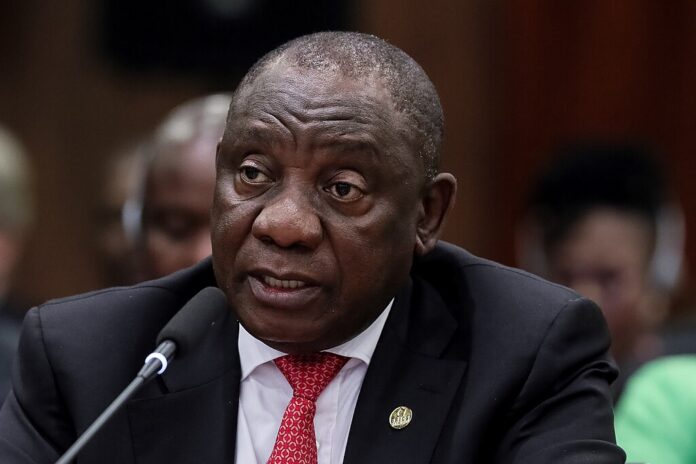Amidst a significant electoral setback, ANC President Cyril Ramaphosa champions a government of national unity (GNU) as the optimal strategy for stabilizing South Africa’s political landscape and advancing national progress
South African President Cyril Ramaphosa has underscored the necessity of forming a Government of National Unity (GNU) following the ANC’s loss of its majority in the May 29 general elections. Addressing the party’s national executive committee (NEC) at their three-day lekgotla in Johannesburg, Ramaphosa positioned the GNU as the most viable tactical option for advancing the country’s interests in the wake of an unprecedented electoral outcome.
The ANC’s recent performance marked a historic low, with the party losing its outright majority and its vote share dipping below 50% in key provinces such as KwaZulu-Natal, Gauteng, and the Northern Cape. This represents a seismic shift in South Africa’s political landscape, breaking the ANC’s 30-year streak of single-party dominance.
Embed from Getty ImagesThe lekgotla, attended by the leadership of the South African Communist Party (SACP) among other alliance partners, saw extensive deliberation on the party’s dramatic electoral decline and its implications. The SACP, which had criticized the ANC’s decision to include the Democratic Alliance (DA) and the Freedom Front Plus in the GNU, had advocated for a coalition with the Economic Freedom Fighters (EFF). Despite this, Ramaphosa highlighted the GNU as a pragmatic response to the new political reality.
In his address, Ramaphosa acknowledged the SACP’s historic role in fighting apartheid and its contributions to the principles of nonracialism. He emphasized that the NEC’s decision to pursue a GNU was driven by a need to address the fundamental transformation of South Africa, reflecting the new political dynamics that no longer allow the ANC to govern alone.
Ramaphosa stressed that the GNU was not an easy decision, but one made with full awareness of its potential risks and rewards. He pointed out that the GNU, unlike typical coalitions, brings together parties across the political spectrum to tackle national conflicts and significant socioeconomic challenges through cooperation.
The NEC’s deliberations included a focus on how the GNU could foster a stable and effective government capable of meeting the aspirations of the South African people. Ramaphosa asserted that the ANC’s approach was rooted in a commitment to address the country’s challenges and work collaboratively with all sectors willing to contribute.
The GNU’s formation is set against a backdrop of public frustration with political infighting and perceived inefficiency. Ramaphosa emphasized that South Africans are calling for leaders to prioritize their needs and work together for the country’s benefit. The ANC, he said, remains dedicated to advancing the National Democratic Revolution and achieving a united, nonracial, non-sexist, democratic, and prosperous South Africa.
In his closing remarks, Ramaphosa outlined the next steps for the ANC, which include building a robust and inclusive economy, fostering democratic renewal, and assessing the effectiveness of existing plans to enhance growth, investment, and job creation.
Meanwhile, DA federal chair Helen Zille remarked that her party’s decision to collaborate with the ANC in the GNU was motivated by the need to prevent a potentially disastrous coalition involving the MK Party and the EFF. Zille emphasized the importance of stabilizing the economy, which she claimed would have been jeopardized by such a coalition.
As South Africa transitions into a new political era, the formation of the GNU represents a critical juncture for the country’s governance and national cohesion, with Ramaphosa and the ANC seeking to navigate the complexities of this unprecedented political landscape.
Analysis:
Political:
President Cyril Ramaphosa’s push for a Government of National Unity (GNU) reflects the ANC’s strategic adaptation to a new political reality. The ANC’s loss of a majority necessitates collaboration with various political parties, including those with differing ideologies, to ensure effective governance. The GNU represents a pragmatic solution to address the party’s weakened position and to secure a stable government capable of advancing national interests. This shift highlights the challenges of governing in a more fragmented political environment and the need for cross-party cooperation to achieve stability and progress.
Social:
The call for a GNU underscores a broader societal demand for effective governance and political unity. South Africans are increasingly frustrated with political infighting and inefficiency, and the GNU is seen as a means to address these concerns. By bringing together diverse political forces, the GNU aims to reflect a broader spectrum of societal interests and address the pressing challenges facing the nation. This approach aligns with public expectations for leaders to prioritize collective solutions over partisan conflicts.
Racial:
The formation of a GNU could impact racial dynamics in South Africa by promoting inclusivity and cooperation among various political groups. The ANC’s historical role in advancing nonracialism is challenged by the current political landscape, which necessitates collaboration with parties that may have different perspectives on racial and social issues. The GNU could serve as a platform for addressing racial inequalities and fostering greater unity among South Africa’s diverse population.
Gender:
The GNU could also influence gender dynamics within South African politics. As the country transitions into this new political arrangement, there may be opportunities to enhance gender representation and address gender-specific issues more effectively. The inclusion of multiple parties in the GNU provides a chance to incorporate diverse perspectives on gender equality and women’s empowerment, contributing to more balanced and inclusive governance.
Economic:
Economically, the GNU aims to stabilize and advance South Africa’s growth amid political uncertainty. The collaboration between parties with varying economic viewpoints could lead to more comprehensive economic policies and strategies. The GNU’s focus on building a strong and inclusive economy, enhancing growth, and creating jobs is crucial for addressing the economic challenges facing the country. The formation of a GNU could potentially lead to more effective economic governance and investment in key areas of development.
